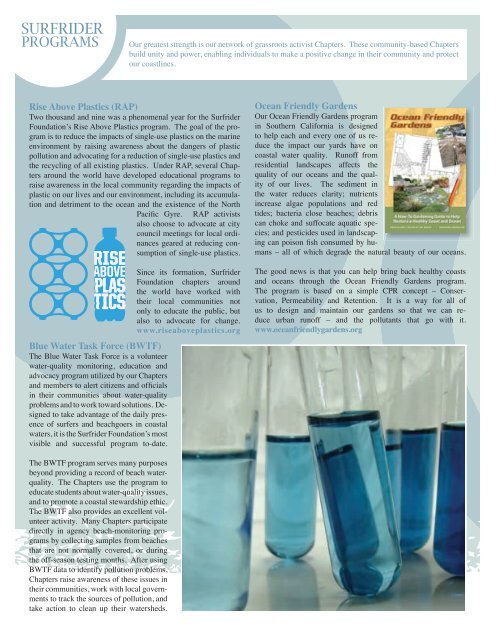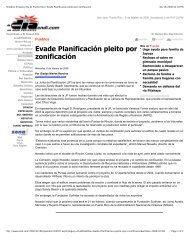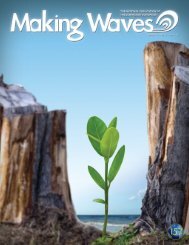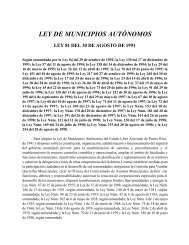Annual Report 2009 - Surfrider Foundation
Annual Report 2009 - Surfrider Foundation
Annual Report 2009 - Surfrider Foundation
You also want an ePaper? Increase the reach of your titles
YUMPU automatically turns print PDFs into web optimized ePapers that Google loves.
Our greatest strength is our network of grassroots activist Chapters. These community-based Chapters<br />
build unity and power, enabling individuals to make a positive change in their community and protect<br />
our coastlines.<br />
Rise Above Plastics (RAP)<br />
Two thousand and nine was a phenomenal year for the <strong>Surfrider</strong><br />
<strong>Foundation</strong>’s Rise Above Plastics program. The goal of the program<br />
is to reduce the impacts of single-use plastics on the marine<br />
environment by raising awareness about the dangers of plastic<br />
pollution and advocating for a reduction of single-use plastics and<br />
the recycling of all existing plastics. Under RAP, several Chapters<br />
around the world have developed educational programs to<br />
raise awareness in the local community regarding the impacts of<br />
plastic on our lives and our environment, including its accumulation<br />
and detriment to the ocean and the existence of the North<br />
Pacific Gyre. RAP activists<br />
also choose to advocate at city<br />
council meetings for local ordinances<br />
geared at reducing consumption<br />
of single-use plastics.<br />
Blue Water Task Force (BWTF)<br />
The Blue Water Task Force is a volunteer<br />
water-quality monitoring, education and<br />
advocacy program utilized by our Chapters<br />
and members to alert citizens and officials<br />
in their communities about water-quality<br />
problems and to work toward solutions. Designed<br />
to take advantage of the daily presence<br />
of surfers and beachgoers in coastal<br />
waters, it is the <strong>Surfrider</strong> <strong>Foundation</strong>’s most<br />
visible and successful program to-date.<br />
Since its formation, <strong>Surfrider</strong><br />
<strong>Foundation</strong> chapters around<br />
the world have worked with<br />
their local communities not<br />
only to educate the public, but<br />
also to advocate for change.<br />
www.riseaboveplastics.org<br />
Ocean Friendly Gardens<br />
Our Ocean Friendly Gardens program<br />
in Southern California is designed<br />
to help each and every one of us reduce<br />
the impact our yards have on<br />
coastal water quality. Runoff from<br />
residential landscapes affects the<br />
quality of our oceans and the quality<br />
of our lives. The sediment in<br />
the water reduces clarity; nutrients<br />
increase algae populations and red<br />
tides; bacteria close beaches; debris<br />
can choke and suffocate aquatic species;<br />
and pesticides used in landscaping<br />
can poison fish consumed by humans<br />
– all of which degrade the natural beauty of our oceans.<br />
The good news is that you can help bring back healthy coasts<br />
and oceans through the Ocean Friendly Gardens program.<br />
The program is based on a simple CPR concept – Conservation,<br />
Permeability and Retention. It is a way for all of<br />
us to design and maintain our gardens so that we can reduce<br />
urban runoff – and the pollutants that go with it.<br />
www.oceanfriendlygardens.org<br />
The BWTF program serves many purposes<br />
beyond providing a record of beach waterquality.<br />
The Chapters use the program to<br />
educate students about water-quality issues,<br />
and to promote a coastal stewardship ethic.<br />
The BWTF also provides an excellent volunteer<br />
activity. Many Chapters participate<br />
directly in agency beach-monitoring programs<br />
by collecting samples from beaches<br />
that are not normally covered, or during<br />
the off-season testing months. After using<br />
BWTF data to identify pollution problems,<br />
Chapters raise awareness of these issues in<br />
their communities, work with local governments<br />
to track the sources of pollution, and<br />
take action to clean up their watersheds.






